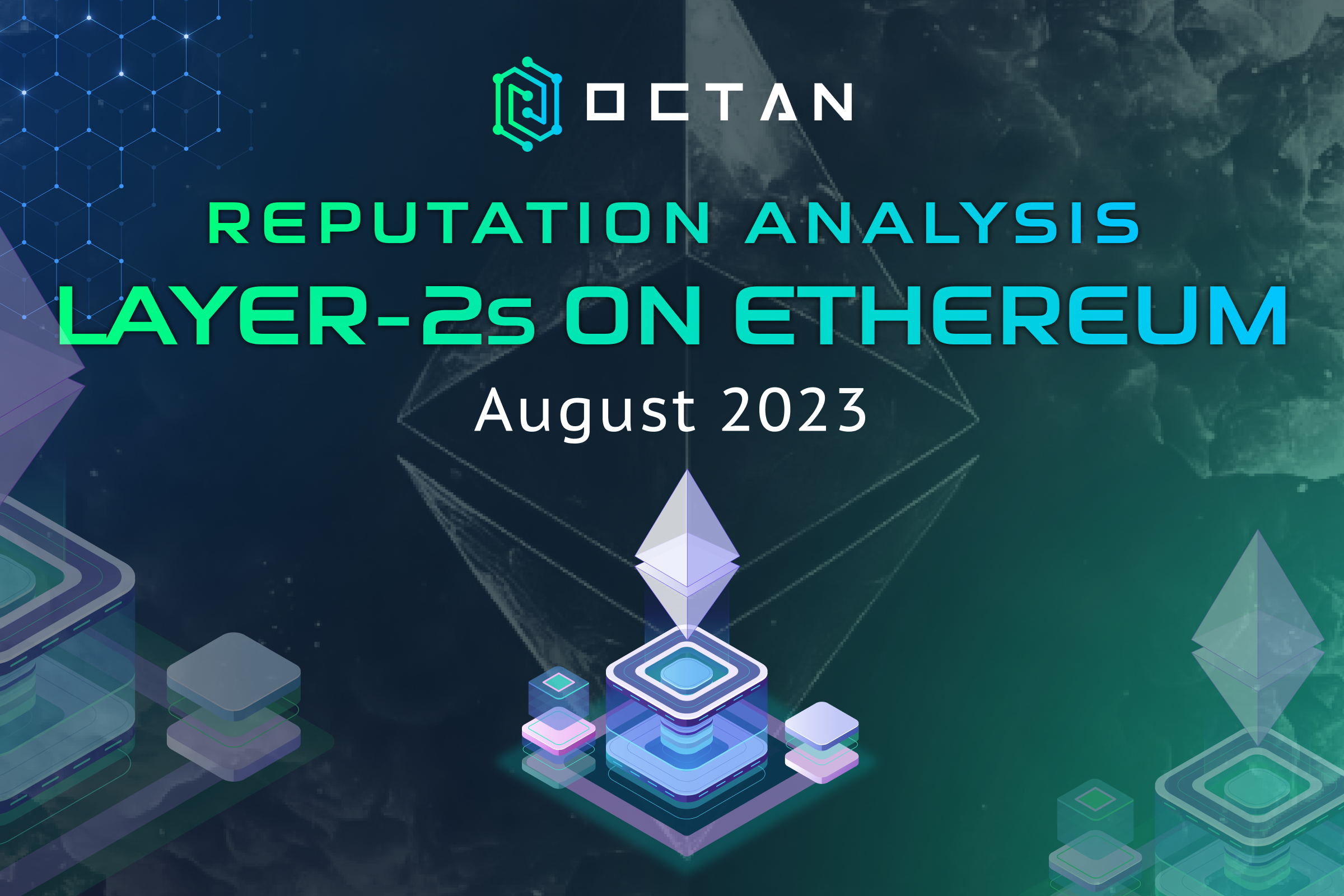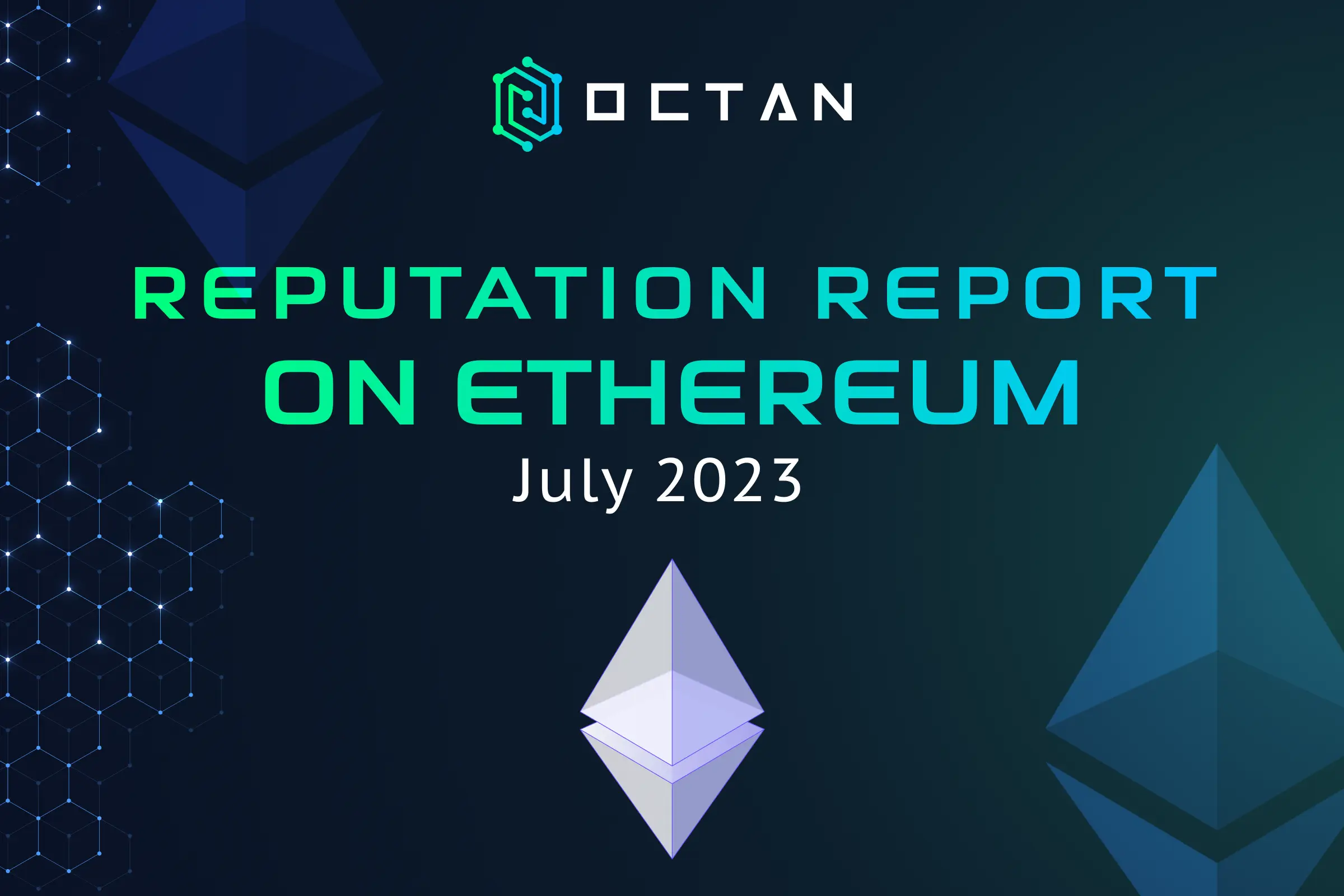Highlights
- Block range from 16,000,000 (18/11/2022) to 17,823,594 (01/08/2023) with 566M+ transactions, 1.6M+ contracts, 39M+ unique active wallets.
- DeFi, NFT, stablecoin are the Top3 categories on Ethereum, respectively accounting for 15.7%, 11.5%, 9.96% reputation value of the contract group. Surprisingly, meme tokens take 5.4% of reputation value, while L2 contracts, SocialFi, GameFi are 1.9%, 1.74%, 1.01%, respectively.
- Dollar-pegged USDT stablecoin (Tether) contract has the highest GS (~38K) and of UAWs (5M+).
- ZkSync, Starknet contracts have very high ranks of #3 and #11, respectively, large numbers of UAWs with good average reputation scores.
- The Reputation Score of calculated wallets (EOA group) on Ethereum is highly concentrated in the range of Medium ( ~65%) and Experience ( ~22%) partitions, both contributing 52.6% of total reputation points. The low (~7.6%) and lowest (~5.7%) partitions have a small contribution (0.66%) to the total GRS value.
- Zero-GRS wallets are inactive for long-time with few (low-valuable) transactions in the calculated ranges.
Octan Reputation Ranking Reports PDFs:
Primer on Ethereum
Founded in 2013 by Vitalik Buterin, Ethereum is the world’s second-largest ecosystem by market capitalization, the leading Turing-complete blockchain network for Web3 and decentralized applications (dApps). With its strong track record and widespread adoption, Ethereum is synonymous with innovation and has a significant impact on the blockchain industry.
Currently, nearly 24M (~20% of total supply) Ether tokens are staked to run 745,624 validator nodes for securing the network. Ethereum is hosting nearly 3000 dApps, millions of smartcontracts serving more than 218 million wallets of users.
Primer on Octan Reputation Score
Inspired by Google PageRank, Octan Network innovates a Reputation Ranking System (RRS) to establish trust and credibility in Web3 space. Octan’s Reputation Score (RS) is a metric to measure the trustworthiness and reliability of an account within a Web3 ecosystem. A higher Reputation Score indicates a higher level of trust and importance within the blockchain. RS captures Web3 social insights, user activities and behaviors via on-chain records: transactions, contract interactions, transactional volume, and gas spent; providing a universal, comparative, and quantitative measurement of the reputation of accounts within communities and the entire space.
Octan RRS employs sophisticated ranking algorithms (e.g. adaptive PageRank) to calculate the reputation scores of accounts (both contracts and individual wallets – EOAs) and analyze graphs of transactions recorded on chains, making RS a highly valuable metric for extracting social insights and user persona, evaluating dapps and their user quality in the dynamic and rapidly evolving Web3 ecosystems. Read more about the conceptualization of “Octan Reputation Ranking System”.
Key Metrics
Octan Global Reputation Score (GRS or RS) assigns 1,000,000 reputation points distributed for all public addresses (accounts) on the entire Ethereum ecosystem within the calculated range. The analysis covered a block range spanning from 16,000,000 (18/11/2022) to 17,823,594 (01/08/2023) and yielded the following results:
| No. Blocks | 1,823,594 |
| No. Transactions | 566,382,361 |
| Total gas spent (ETH) | 4,385,969 |
| Addresses | |
| Total | 41,366,268 |
| Contracts | 1,627,154 |
| No of contracts with zero-GRS | 133,007 |
| Externally owned accounts (EOAs) | 39,739,114 |
| Externally owned accounts (EOAs) with zero-GRS | 7,883,883 |
| Average Global Reputation Score (GRS): arithmetic mean equals the sum of GRS over all addresses divided by the count of addresses. | |
| Contract group | 0.241 |
| EOA group | 0.015 |
| Non-zero EOA group | 0.024 |
| GRS Variance: measuring deviation of addresses’ GRS around the median, i.e. the middle value. Higher variance, father deviation of the considered group | |
| Contract group | 1510 |
| EOA group | 50.5 |
Global Reputation Score: Overview
In this section, we delve into the analysis of the Global Reputation Score (GRS or RS) within the Ethereum ecosystem. Reputation Score (RS) serves as a valuable metric for assessing the reputation and quality of participants, including both Contracts and EOAs (Externally Owned Accounts). The report serves as a valuable resource for understanding the performance, activity, and reputation dynamics within the Ethereum ecosystem.

GRS histogram of all address (Contracts + EOAs)
 |
 |
Reputation Score Distribution of all calculated addresses (Contracts + EOAs) by and log scale (right).
Reputation value distribution in different groups
To gain a comprehensive understanding of reputation value allocation, we analyze the distribution across various groups. The tables and pie charts below present the number of addresses in each group and the corresponding total reputation value, allowing us to assess the importance and contribution of each group to the overall reputation within the ecosystem.
We explore the historical changes of Top entities varying different reputation ranking periods.
Global Reputation Score Analysis: Contract Group
In this section, we uncover an in-depth analysis of the Global Reputation Score (GRS) specifically focusing on Contract addresses within the Ethereum Blockchain. The number of computed contracts is 1,627,154 equivalent to 3.93% of the total considered addresses, but their total reputation values 392,385 scores accounting for 39.24% reputation points on the entire ecosystem.
Considering the group of all contracts, DeFi, NFT, stablecoin are the Top3 categories on Ethereum, respectively accounting for 15.7%, 11.5%, 9.96% reputation value of the contract group. Surprisingly, meme tokens take 5.4% of reputation value, while L2 contracts, SocialFi, GameFi are 1.%, 1.74%, 1.01%, respectively.
We classify contracts into various categories: custodial contracts of centralized exchanges (CEX), contracts handling cross-chain assets, Decentralized Autonomous Organizations (DAO), Decentralized Finance (DeFi), GameFi, SocialFi, NFT, Liquidity Staking Derivatives (LSDs), MEV-bots, meme tokens, stablecoins, multisig wallet contracts of reputable institutions or VCs, and identified but unclassifiable contracts. The remaining is unknown contracts.
Now, we explore Top 10 Contracts on Ethereum by Reputation Score, corresponding with their UAWs and average RS per UAW. Dollar-pegged USDT stablecoin (Tether) contract has the highest GS (~38K) and of UAWs (5M+). The zkSync, Starknet contracts have very high ranks of #3 and #11, respectively, large numbers of UAWs with good average reputation scores (much higher than the average of non-zero-GRS EOAs on the chain).
Partition on contract group by reputation scores
Global Reputation Score Analysis: EOA Group
In this section, we explore the partitioning of Global Reputation Scores (GRS or RS) on externally owned accounts (EOAs) within the Ethereum ecosystem. This is a comprehensive and useful measurement for user quality and user segmentation on the blockchain.
- No of EOAs: 39,739,114
- No of EOAs with zero-GRS: 7,883,883
We divide the non-zero EOA group into six partitions based on ranges of reputation scores: Lowest, Low, Medium, Experience, High, and Highest.
Global Reputation Score of calculated wallets (EOA group) on Ethereum is highly concentrated in the range of Medium ( ~65%) and Experience ( ~22%) partitions, both contributing 52.6% of total reputation points. The low (~7.6%) and lowest (~5.7%) partitions have a small contribution (0.66%) to the total GRS value. Zero-GRS wallets are inactive for long-time with few (low-valuable) transactions in the calculated ranges.
Average reputation Score per partition
Top 10 EOAs Per Partition
In this section, we will highlight the top wallets in each partition and provide a brief overview of their rankings and activities.
About Octan
Establish Trust and Credibility in Web3
Octan Network is an award-winning data analytics provider in the Web3 space, achieving recognitions from industry-prominent organizations: BNB Grant DAO on Dorahack, Web3 Matching by BNB Chain, Octopus Accelerator Program, DFINITY Developer Grant Program.
Octan Network, instead of focusing on cash-flow & financial analytics, we use our unique Ranking Reputation System (RSS), inspired by Google’s PageRank, to provide reputation and ranking scores for accounts across chains and applications. By qualifying, classifying, evaluating, and extracting social insights from Web3 entities, our system provides the best quality analytics and the most multi-dimensional insights on Web3. Applications of Octan Reputation Ranking & onchain analytics:
- User segmentation: By leveraging new data sources and advanced analytics tools, RRS provides valuable insights about entities in the Web3 ecosystem. This enables projects and marketing agencies to utilize reputation scores and analysis reports to effectively classify, qualify, and segment users and audiences in the Web3 space, aiding in user acquisition strategies.
- Investment research: Investors can utilize the RRS to gain a comprehensive assessment of a project by analyzing the activity levels of the project’s contracts and the quality of user wallets interacting with those contracts; helps investors easily select promising projects based on reputation and performance, enabling them to conduct more in-depth financial analysis
- Onchain research and analysis: Researchers and analysts can leverage the RRS to identify emerging trends and opportunities in the Web3 space through the transformations in the reputation of Web3 entities. By studying these reputation changes, they can gain valuable insights into market dynamics, user behavior, and ecosystem developments.
Octan’s onchain analytical reports provide a comprehensive view of the Web3 ecosystems and its entities. These reports, produced by Octan data analysis experts, offer reputation scores of notable entities and segmentation, providing valuable social insights and social interaction within the Web3 space. Furthermore, Octan offers visualizations showcasing relationships and connections between Web3 entities. This allows clients to easily comprehend and interpret the reputation data generated by Octan.
- Visit our Gitbook at https://docs.octan.network/ to learn more.
- Visit Octan comprehensive reputation reports.
- Read Octan Reputation and Onchain Analysis Blogs https://blog.octan.network/
- For access to the detailed ranking table and more comprehensive information, please feel free to contact us ([email protected]).
- Visit our socials: Twitter | Facebook | Telegram | Linkedin












